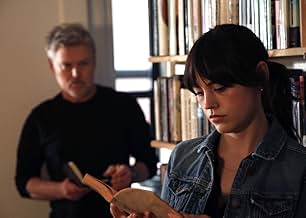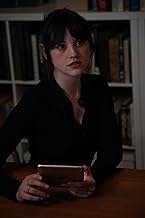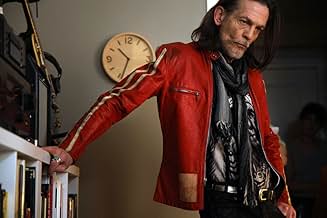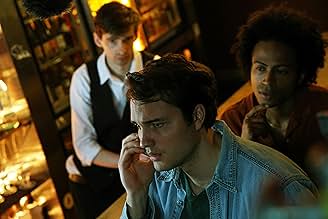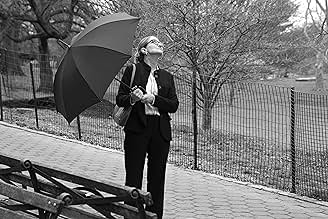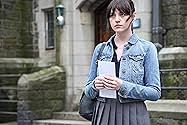Joseph Fulton, un famoso director, quiere trabajar en un cementerio. Mientras tanto, redacta su testamento. Su novia cree que se está muriendo. El rumor se extiende y pronto todos sus conoci... Leer todoJoseph Fulton, un famoso director, quiere trabajar en un cementerio. Mientras tanto, redacta su testamento. Su novia cree que se está muriendo. El rumor se extiende y pronto todos sus conocidos se reúnen para darle el último adiós.Joseph Fulton, un famoso director, quiere trabajar en un cementerio. Mientras tanto, redacta su testamento. Su novia cree que se está muriendo. El rumor se extiende y pronto todos sus conocidos se reúnen para darle el último adiós.
- Dirección
- Guionista
- Elenco
- Dirección
- Guionista
- Todo el elenco y el equipo
- Producción, taquilla y más en IMDbPro
Opiniones destacadas
It is hard to write about _Where to Land_
as a stand-alone film, but I'll try for
one paragraph. Protagonist Joe Fulton
(Bill Sage, who does not resemble his
namesake in _Meanwhile_) is pondering
retirement, a second career, and writing a
will. He is a noted director of "romantic
comedies," but the new generation only
remember him for the "grenade movie."
(Sage is an obvious stand-in for director
Hartley, whose fans all know this is
_Trust_ -- so much more than a rom com.)
Fulton views his growing irrelevance among
young hipsters with detached bemusement.
News spread that he is dying, causing consternation among his actress lady friend, niece, and cohort of associates and neighbors. A metaphoric "son" from a girlfriend past comes out of the woodwork.
In the Blu-ray extras Hartley likens this gentle comedy to Moliere. After many esoteric debates with the Greek chorus over dodgy light beer ($1.5 a bottle), and even a gut-punch for old time's sake, all ends well. Fulton is asked to direct again from a script about a beer-making nun (the story told in Hartley's marvelous novel _Our Lady of the Highway_).
If you scoff at cell phones, agonize over bequeathing your 6 dinner plates and a mountain of books, and like to genuflect on how life's outlook change at the end of careers, _Where to Land_ is perfect for you. Films about directors' and writers' endgames are so rare. Or perhaps I tend to skip Angle-US entries which treat authors as celebrities swilling brand-name wines, who would be indistinguishable from real estate agents if it weren't for literary name-dropping and dinner parties. Such films focus on the communal trappings, light years away from the Fulton's down-to-earth inner circle (apartment supers running for election, neighborhood priests, grocery store owners).
Perhaps a companion piece is _Starting Out in the Evening_, especially its ending. If I have one criticism, it is that the young cast members are rather upstaged by the old timers; there is no new Sage or Elina Lowensohn, who got their starts with Hartley, being discovered here.
But I may be wrong. (Lauren Ambrose, with her dynamic star-turn in _Starting Out in the Evening_, would have killed in Hartley's universe!)
Hartley admits in an interview that _Where to Land_ is likely his cinematic last will and testament. There will be no adaptation of _Our Lady of the Highway_, ready-made for his trademark Dutch angles and guitar riff act-breaks! But in fact his style has evolved. His actors used to be acrobats (see Bill Sage's manic turn in _Theory of Achievement_). Sage's Fulton now moves with a stately, measured grace -- you can see ironic observations churning in his head even when he is silent -- although his "son" still has a hustler's nervous energy. The immortal "Let me win Lotto tonight" in _Theory of Achievement_ has given way to Beethoven's piano concerto #4.
The camera work and editing feel less jagged, and older characters speak in entire paragraphs. There is a new-found precision, with objects quantified and at rest, their destinies fulfilled. Yet there is also an elegiac sadness, especially about the impending climate change apocalypse. When Fulton recounts his mistakes with the women he loved, it is impossible not to think of the late Adrienne Shelly, star of _Trust_ and _Unbelievable Truth_, and feel a chill down one's spine.
I have never asked why I used to feel such kinship with Hartley's characters, all born with the proverbial sign of the windmill.
Watching his short films again I realize it must be the stubborn purity of those films, the spiritual insecurity/yearning, the desperation to defy conformity (and real estate agents' fate). One archetype must have been Bill Sage striving to write the greatest pop song in history in _Theory of Achievement_, despite knowing nothing about music. (Hartley himself, in contrast, is a self-taught intellectual who talked like a theology professor on day one. He was also awarded a Cannes best screenplay and France's Chevalier of the order of arts and letters.) By sheer delusion of grandeur and ridiculousness Hartley's outsiders end up winning a Nobel Prize, dying in gunfights, going to jail, or get exiled overseas, with the last three occurring with the greatest regularity.
It is a miracle then, that we all get to end things on our own terms. And begin again.
I'm sure we will be reading more about blue-collar priests, amnesiac assassins, ex-con mechanics who knows all about thermodynamics, in his novels to come. When Bill Sage rolls up the collar of his suit at the film's end he looks just like Robert John Burke at the beginning of _Unbelievable Truth_, on the verge of a fantastic odyssey.
News spread that he is dying, causing consternation among his actress lady friend, niece, and cohort of associates and neighbors. A metaphoric "son" from a girlfriend past comes out of the woodwork.
In the Blu-ray extras Hartley likens this gentle comedy to Moliere. After many esoteric debates with the Greek chorus over dodgy light beer ($1.5 a bottle), and even a gut-punch for old time's sake, all ends well. Fulton is asked to direct again from a script about a beer-making nun (the story told in Hartley's marvelous novel _Our Lady of the Highway_).
If you scoff at cell phones, agonize over bequeathing your 6 dinner plates and a mountain of books, and like to genuflect on how life's outlook change at the end of careers, _Where to Land_ is perfect for you. Films about directors' and writers' endgames are so rare. Or perhaps I tend to skip Angle-US entries which treat authors as celebrities swilling brand-name wines, who would be indistinguishable from real estate agents if it weren't for literary name-dropping and dinner parties. Such films focus on the communal trappings, light years away from the Fulton's down-to-earth inner circle (apartment supers running for election, neighborhood priests, grocery store owners).
Perhaps a companion piece is _Starting Out in the Evening_, especially its ending. If I have one criticism, it is that the young cast members are rather upstaged by the old timers; there is no new Sage or Elina Lowensohn, who got their starts with Hartley, being discovered here.
But I may be wrong. (Lauren Ambrose, with her dynamic star-turn in _Starting Out in the Evening_, would have killed in Hartley's universe!)
Hartley admits in an interview that _Where to Land_ is likely his cinematic last will and testament. There will be no adaptation of _Our Lady of the Highway_, ready-made for his trademark Dutch angles and guitar riff act-breaks! But in fact his style has evolved. His actors used to be acrobats (see Bill Sage's manic turn in _Theory of Achievement_). Sage's Fulton now moves with a stately, measured grace -- you can see ironic observations churning in his head even when he is silent -- although his "son" still has a hustler's nervous energy. The immortal "Let me win Lotto tonight" in _Theory of Achievement_ has given way to Beethoven's piano concerto #4.
The camera work and editing feel less jagged, and older characters speak in entire paragraphs. There is a new-found precision, with objects quantified and at rest, their destinies fulfilled. Yet there is also an elegiac sadness, especially about the impending climate change apocalypse. When Fulton recounts his mistakes with the women he loved, it is impossible not to think of the late Adrienne Shelly, star of _Trust_ and _Unbelievable Truth_, and feel a chill down one's spine.
I have never asked why I used to feel such kinship with Hartley's characters, all born with the proverbial sign of the windmill.
Watching his short films again I realize it must be the stubborn purity of those films, the spiritual insecurity/yearning, the desperation to defy conformity (and real estate agents' fate). One archetype must have been Bill Sage striving to write the greatest pop song in history in _Theory of Achievement_, despite knowing nothing about music. (Hartley himself, in contrast, is a self-taught intellectual who talked like a theology professor on day one. He was also awarded a Cannes best screenplay and France's Chevalier of the order of arts and letters.) By sheer delusion of grandeur and ridiculousness Hartley's outsiders end up winning a Nobel Prize, dying in gunfights, going to jail, or get exiled overseas, with the last three occurring with the greatest regularity.
It is a miracle then, that we all get to end things on our own terms. And begin again.
I'm sure we will be reading more about blue-collar priests, amnesiac assassins, ex-con mechanics who knows all about thermodynamics, in his novels to come. When Bill Sage rolls up the collar of his suit at the film's end he looks just like Robert John Burke at the beginning of _Unbelievable Truth_, on the verge of a fantastic odyssey.
Selecciones populares
Inicia sesión para calificar y agrega a la lista de videos para obtener recomendaciones personalizadas
Detalles
- Tiempo de ejecución
- 1h 15min(75 min)
- Color
- Mezcla de sonido
- Relación de aspecto
- 1.78 : 1
Contribuir a esta página
Sugiere una edición o agrega el contenido que falta


